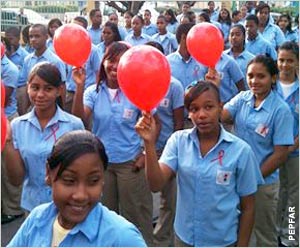Obama Seeks $51.6 Billion for Fiscal Year 2013 Foreign Operations
Obama Seeks $51.6 Billion for Fiscal Year 2013 Foreign Operations
14 February 2012

An employee of the U.S. Government Printing Office pulls a copy of the administration's fiscal year 2013 budget proposal off a prining press line.

The president's 2013 proposed budget would continue funding for disease prevention and agricultural development. These girls are taking part in an HIV awareness activity.
President Obama has proposed $51.6 billion in spending for foreign operations in fiscal year 2013, which begins October 1, 2012.
The proposed amount submitted to Congress February 13 is up 1.6 percent from the amount Congress approved for fiscal year 2012 and would fund the Department of State, the U.S. Agency for International Development and other international programs. The proposal must be approved or modified by the Senate and House of Representatives before going to the president for signature or veto. The proposal may meet resistance in Congress as some lawmakers want to cut foreign aid spending to address U.S. budget shortfalls.
The proposal would invest in long-term partnerships to strengthen diplomatic, development and security activities in Iraq, Afghanistan and Pakistan. Iraq would receive $4.8 billion — about 10 percent less than in 2012 — to fund police training, military transition, health, education, private-sector development and public outreach. Afghanistan would get $4.6 billion to fight terrorism and for programs in governance, rule of law, counternarcotics, economic growth, agriculture, health and education. Pakistan would receive $2.4 billion in aid to assist in strengthening democratic and civil society institutions.
The request includes more than $800 million to assist countries in transition in the Middle East and North Africa and would create incentives for those countries to adopt long-term political, economic and trade reforms.
The president’s budget would advance HIV prevention efforts, including support for 6 million HIV patients who receive antiretroviral drugs. The budget would invest nearly $8 billion in the President’s Global Health Initiative, fully fund the balance of the administration’s $4 billion pledge to the Global Fund to Fight AIDS, Tuberculosis and Malaria, and fulfill its pledge to the Global Alliance for Vaccines and Immunizations to expand children’s access to immunizations globally.
The requested spending would continue support for agricultural development and nutrition through the president’s Feed the Future initiative and the multi-donor Global Agriculture and Food Security Program. Those programs direct funding to countries that commit to policy reforms and strong country-led strategies that address local food needs. The requested amount would maintain support for food aid and humanitarian assistance, including more than $4 billion to help internally displaced persons, refugees and victims of armed conflict and natural disasters.
The request also provides $2.9 billion to the Treasury Department to meet U.S. commitments to the multilateral development banks and for bilateral debt relief, and includes $432 million to help five international trade–related agencies promote international trade and tourism. It proposes nearly $900 million for the Millennium Challenge Corporation, $375 million for the Peace Corps, and investments to encourage private-sector spending on clean energy and reductions in greenhouse gas emissions.
For citizens of other countries, the proposed budget includes enhancements in consular services where there is high demand for visas.
One proposed area to get a significant funding reduction is Europe and Eurasia, to reflect the successful transitions to market-based economies in some countries.
MORE FOR AGRICULTURE RESEARCH
The agriculture portion of the budget would increase to $325 million the U.S. Department of Agriculture’s spending for food and agricultural research targeting global food security, nutrition, food safety, sustainable bioenergy and climate change. It would decrease subsidies to crop-insurance companies and over 10 years eliminate direct farm payments.